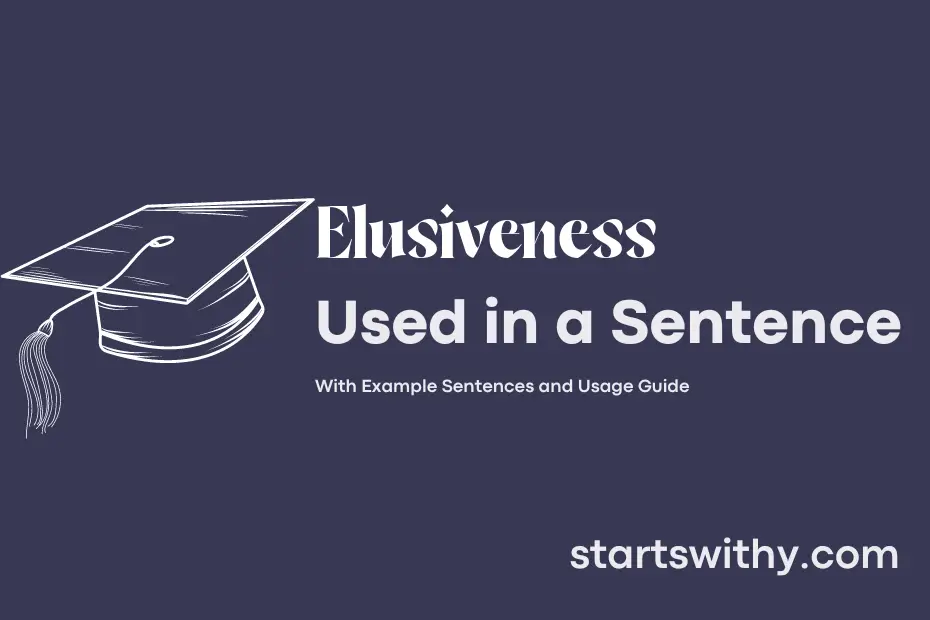Elusiveness is a term used to describe the quality of being difficult to grasp, capture, or pin down. This trait can be applied to various aspects of life, whether it be a person’s elusive personality, the elusive nature of a concept, or the elusive answers to a complex problem.
In writing, elusiveness can be seen as a theme or technique that adds depth and intrigue to a text. Authors may use elusive characters or elusive plot points to keep readers engaged and eager to uncover the mystery within the story.
7 Examples Of Elusiveness Used In a Sentence For Kids
- The elusiveness of the butterfly made it hard to catch.
- We were surprised by the elusiveness of the squirrel as it jumped from tree to tree.
- The tiny firefly’s elusiveness made it difficult to capture in the jar.
- The elusiveness of the rabbit in the garden kept us entertained for hours.
- We marveled at the elusiveness of the fish as it swam swiftly through the water.
- The cat’s playfulness and elusiveness made it a fun pet to chase.
- The elusiveness of the kite in the sky made it a challenge to keep flying.
14 Sentences with Elusiveness Examples
- Elusiveness of the concept made it difficult for the students to grasp during the lecture.
- The professor’s explanation only added to the elusiveness of the topic, leaving the students confused.
- Despite countless attempts, the solution to the math problem remained shrouded in elusiveness.
- The elusiveness of a perfect GPA motivates students to work harder and strive for excellence.
- Many students find themselves struggling with the elusiveness of time management in college.
- The elusiveness of internships in top companies adds to the pressure on college students to excel academically.
- The elusiveness of finding affordable housing for students near campus is a common issue faced by many in India.
- The elusiveness of steady internet connectivity is a constant challenge for students attending online classes.
- Students often find themselves lost in the elusiveness of job opportunities after graduation.
- The elusiveness of a work-life balance can make it challenging for students to juggle academics with personal commitments.
- The elusiveness of finding reliable study resources online can hinder a student’s ability to excel in their coursework.
- The elusiveness of a quiet study space on a bustling college campus can be frustrating for students looking to focus.
- The elusiveness of affordable textbooks forces many students to seek alternative sources or shared resources.
- The elusiveness of landing a coveted scholarship makes it essential for students to excel in academics and extracurricular activities.
How To Use Elusiveness in Sentences?
To use “Elusiveness” in a sentence, begin by understanding that elusiveness refers to the quality of being difficult to grasp, define, or pin down. When incorporating this term into a sentence, consider describing a person, concept, or object that is deliberately vague, ambiguous, or challenging to understand.
For example, you could say, “The mystery novel’s plot was filled with elusiveness, leaving readers guessing until the very last page.” In this sentence, elusiveness is used to convey the idea that the plot was hard to follow or predict, adding intrigue to the story.
Alternatively, you might write, “The athlete’s elusiveness on the field made it nearly impossible for defenders to tackle him.” Here, elusiveness is used to describe the athlete’s ability to avoid being caught or intercepted by opponents, highlighting their agility and skill.
Remember that elusiveness is a word that typically conveys a sense of ambiguity, slipperiness, or evasion. When using elusiveness in a sentence, consider the context in which it is being employed and strive to make your meaning clear to your audience.
Ultimately, incorporating elusiveness into your writing can help you convey a sense of mystery, intrigue, or complexity. Practicing using this term in various contexts will enhance your fluency and ability to communicate effectively.
Conclusion
In conclusion, the concept of elusiveness refers to the quality of being difficult to grasp or define. This elusive nature can be observed in various contexts, such as the fleeting memories of a dream or the elusive answers to complex philosophical questions. Despite efforts to understand or capture elusive ideas or phenomena, they often slip away, leaving a sense of mystery and intrigue.
By examining sentences with elusiveness, we can appreciate the subtlety and enigmatic nature of this concept. Whether it is describing the elusive nature of a concept in a scientific paper or the elusive beauty of a sunrise in a poem, the elusiveness adds depth and complexity to our understanding of the world around us.



